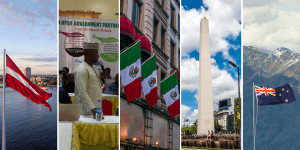Prioritising Algorithmic Transparency in a Data-Driven World in New Zealand
This blog is part of a series from students of the Institut de Sciences Politiques de Paris who interviewed reformers working on initiatives recognized by the OGP Leaders Network. Read the series here.
As a member of the Open Government PartnershipThe Open Government Partnership (OGP) is a multi-stakeholder initiative focused on improving government transparency, ensuring opportunities for citizen participation in public matters, and strengthen... More since 2013, New Zealand is a nation with strong commitments to anti-corruption and governmental transparencyAccording to OGP’s Articles of Governance, transparency occurs when “government-held information (including on activities and decisions) is open, comprehensive, timely, freely available to the pub... More. This has led to a number of collaborative projects between the government, civil society, the private sectorGovernments are working to open private sector practices as well — including through beneficial ownership transparency, open contracting, and regulating environmental standards. Technical specificat... More and international partners. Now, the New Zealand government is working to improve their transparency and accountability in the use of algorithms; a project that benefits from high levels of civil society engagement.
We discussed this government-civil society partnership with Penny Ehrhardt, Principal Policy Advisor at the government department for data, Stats New Zealand, and Laurence Millar, Member with Delegated Authority of the civil society organisation Transparency International New Zealand (TINZ).
Algorithmic transparency in New Zealand – where did it all begin?
When used by governments, algorithms allow for better understanding of citizens, which helps the government to make more informed decisions and deliver more effective services. This prompted the New Zealand government to address the complex issue of algorithmic transparency, in order to increase public trust and confidence in governmental decision-making. Following a review in 2018 of how government agencies use algorithms to improve the lives of citizens, the New Zealand government then collaborated with a number of civil society stakeholders to implement the Algorithm Charter for Aotearoa New Zealand in July 2020. This Charter represents a governmental commitmentOGP commitments are promises for reform co-created by governments and civil society and submitted as part of an action plan. Commitments typically include a description of the problem, concrete action... to carefully manage how algorithms are used in New Zealand. It outlines the government’s aim to minimise unintended algorithmic bias and, consequently, to utilise the power of algorithms to ensure better service-delivery to New Zealanders whilst still maintaining public trust in their usage by the government.
TINZ was a key civil society contributor to the Charter, and now continues to apply positive pressure to the government in order to encourage greater transparency. Representing this organisation, Laurence Millar described working with the government as a “critical but friendly” partnership. For both parties, the aim is clear: to report on what the government has done, what civil society thinks about it, what can be learned from the project, and how New Zealand’s example can be helpful to other countries. The Charter is therefore welcomed as a good first step in New Zealand’s journey towards algorithmic transparency.
What has been the role of Open Government Partnership (OGP)?
Generally speaking, OGP can be seen as the parent organisation of this project, as the third OGP action plan for New Zealand (2018-2020) brought the organisations together. As highlighted by Penny Ehrhardt of Stats New Zealand, “the momentum provided by an international open government platform can create a virtuous circle.”
Main challenges of the project
Tackling algorithmic bias is a key issue, particularly because of the country’s indigenous Mauri population that struggle to be recognised by algorithms. In this respect, the government works in close partnership with the Data Iwi Leaders Group: indigenous leaders in the data sector. A key priority is to acknowledge that algorithms will always contain bias, and to try to proactively cope with it. Another challenge for this project was developing a Charter with wide buy-in across the public service, as signatories are added on a voluntary basis. The government is therefore committed to making the Charter’s implementation as simple as possible.
What’s next?
The partnership between the government and civil society on algorithmic transparency continues to evolve. Looking ahead, the government has committed to holding an independent review of the Charter in mid-2021, one year after its adoption. Another priority is making the New Zealand example known to a wider international audience. In the medium-to-long term, TINZ considers civics educationAccountability within the public education system is key to improving outcomes and attainment, and accountability is nearly impossible without transparent policies and opportunities for participation ... in primary and secondary schools a viable way to increase public awareness of algorithms. For the government and civil society alike, the more clearly the role and content of algorithms can be communicated, the more trust citizens will have. Multi-stakeholder engagement will therefore continue to be the key to achieving algorithmic transparency in New Zealand.
No comments yet
Related Content

A Guide to Open Government and the Coronavirus: Privacy Protections
Governments are collecting unprecedented amounts of personal data to support vital public health efforts, such as tracking COVID-19 transmission and enforcing quarantine. In particular, governments and corporations are collecting and…

Five Government Innovations Recognized for their Work to Open up Government
Five open government reforms from Latvia, Mexico, New Zealand, the city of Buenos Aires, Argentina and the state of Kaduna, Nigeria have been recognized ...

Algorithmic Accountability for the Public Sector: Learning From the First Wave of Policy Implementation
The AI Now Institute, Ada Lovelace Institute, and OGP are partnering to launch the first global study evaluating the initial wave of algorithmic accountability policy.


Leave a Reply